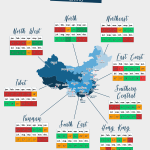
The hot spring was used by emperors as early as the Zhou dynasty followed by other famous emperors such as the First Emperor and Emperor Han Wu Di. However, the most famous users of this hot spring areTang Emperor Ming Huang and his favorite consort Yang Gui Fei, 杨贵妃.
According to the poem the Song of Everlasting Regret, 长恨歌, Emperor Ming Huang bestowed the pool to Lady Yang and they spent the colder seasons enjoying the warm waters and each other’s company.
The poem Song of Everlasting Regret recites:
春寒賜浴華清池,
On a cold spring day, he bestowed upon her the honor of bathing with him at the Huaqing pools
溫泉水滑洗凝脂
The waters of the hot springs were smooth, and washed over her pale white skin.
侍兒扶起嬌無力
The palace maids helped her to leave the pool, because she was too delicate and lacked strength.
始是新承恩澤時
This was when she began to receive the emperor’s advances.
Other more recent users were the Empress Dowager Cixi, 慈禧太后 and Chiang Kai-Shek, 蒋介石. Unfortunately for them, they both used the hot spring under not so happy occasions. The Empress Dowager stayed at the Five-Room Hall in the hot spring complex when Beijing was occupied by the Eight-Power Allied Force in 1900.
Almost four decades later, Chiang Kai-Shek was staying in the same room when the Xian incident, 西安事件 occurred. His generals were concern over Chiang’s obsession to exterminate the communists while not paying attention to the Japanese aggression in northeastern China.
During Chiang’s visit to Xian, his General Zhang Xue Liang decided to arrest him to force him to shift his attention towards the Japanese. Chiang was still sleeping and startled by gun shots. He panicked and fled in his pajamas but was subsequently found and forced to form a united front with the communist against the Japanese invasion. The bullet holes caused by the cross fire during Chiang’s attempted escape can still be seen today. The Xian Incident changed the course of history and contributed towards the founding of China Relief Fund in Nanyang.
Most of the buildings in Hua Qing Hot Spring including a sculpture of Yang Gui Fei are from recent restorations. The Imperial Pools (Star Pool, the Lotus Flower Pool, the Crabapple Pool, the Crown Prince Pool, and the Shangshi Pool) where Emperor Tang Ming Huang and Lady Yang once bathed have been excavated and restored. It is open to the public and is one of the major attractions in the site.
The Tang pools are a big attraction to Japanese tourists who visit Xian in search of sites related to Yōkihi; the Japanese name for Lady Yang Gui Fei.
Visitors can also enjoy a soak in one of the pools for public use. The hot spring waters contain contains lime, sodium carbonate, sodium sulfate, and other minerals and have a constant temperate of 43℃. This is said to be effective for treatment of dermatosis, rheumatism arthritis, and muscular pain.
The Hua Qing Hot springs does not seem to attract much attention from guide books targeted at western readers. Perhaps because they are not familiar with Lady Yang Gui Fei and the significance of Xian incident.
But if traveling is to explore and experience sites of great cultural and historical significance, then Hua Qing Hot Spring should not be missed.





















 Online | Privacy policy
Online | Privacy policy